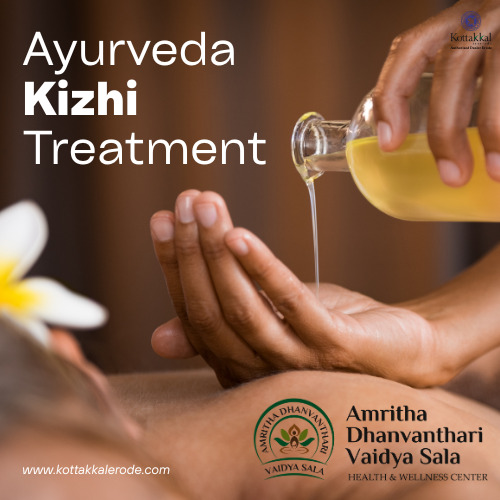In today’s fast-paced world, stress, chronic pain, and fatigue have become common ailments. While modern medicine offers quick fixes, Ayurveda provides holistic healing through time-tested therapies like Ayurveda Kizhi Treatment.
This traditional Kizhi Massage therapy uses warm herbal poultices to alleviate pain, reduce stress, and promote overall well-being. Let’s explore what Kizhi Treatment entails, its benefits, and the different types available.
What is Ayurveda Kizhi Treatment?
Kizhi, also known as Pinda Sweda, is an Ayurvedic Therapy in which the body is gently massaged with heated herbal bundles.
These bundles (or kizhis) are made from medicinal herbs, rice, sand, or powders, wrapped in muslin cloth, and warmed in medicated oils or milk.
The heat and herbal properties penetrate deep into tissues, improving circulation, relieving pain, and detoxifying the body.
Ayurveda Kizhi Treatment: How Does Kizhi Therapy Work?
The treatment follows the Ayurvedic principle of Swedana (sudation), which induces sweating to eliminate toxins and balance the Vata dosha (responsible for movement and pain).
The warmth from the kizhis relaxes muscles, reduces inflammation, and enhances blood flow, making it effective for musculoskeletal and neurological conditions.
Ayurveda Kizhi Treatment: Types of Kizhi in Ayurveda
Depending on the ingredients used, Kizhi treatments are classified into different types, each targeting specific ailments:

1.Podikizhi (Choorna Pinda Sweda) – Uses herbal powders like Kottamchukkadi or Kolakulatthadi, mixed with warm oils. Ideal for arthritis, sports injuries, and muscle stiffness.
2.Elakizhi (Patra Potali Sweda) – Made from medicinal leaves like castor, and tamarind, heated in oils. Effective for joint pain, frozen shoulder, and spondylosis.
3.Navarakizhi (Shashtika Shali Pinda Sweda) – Uses Navara rice cooked in milk and herbal decoctions. Best for paralysis, muscle weakness, and nervous disorders.
4.Manalkizhi (Valuka Sweda) – Involves heated sand bundles, beneficial for chronic pain and inflammation.
Key Benefits of Kizhi Treatment
- Pain Relief: Alleviates joint pain, arthritis, sciatica, and back pain by reducing inflammation.
- Stress Reduction: Improves blood circulation, easing fatigue and anxiety.
- Detoxification: Promotes sweating, flushing out toxins and improving skin health.
- Rejuvenation: Strengthens muscles, enhances mobility, and delays aging.
- Neurological Support: Helps in conditions like paralysis, multiple sclerosis, and nerve damage.
Who Should Avoid Kizhi Therapy?
While Kizhi is highly beneficial, it is not recommended for:
- People with Pitta imbalances (high body heat, acidity).
- Those with skin infections, fever, or open wounds.
- Pregnant women and individuals with severe heart conditions.
What to Expect in a Kizhi Session?
A typical session lasts 45-90 minutes, where warm kizhis are pressed and massaged over oiled skin. A full course may require 7-14 days for optimal results. Post-treatment, rest & hydration are advised to maximize benefits.
Conclusion
Ayurveda Kizhi Treatment is a powerful Ayurvedic massage to heal the body naturally, offering a holistic path to wellness.
Always consult an Ayurvedic practitioner to determine the right type of Kizhi for your needs. Interested in trying Kizhi? Visit a certified Ayurveda Clinic in Erode to experience its rejuvenating effects!
